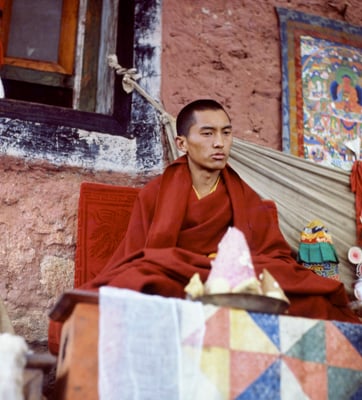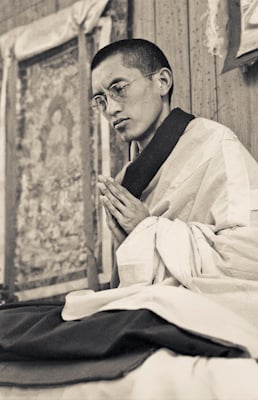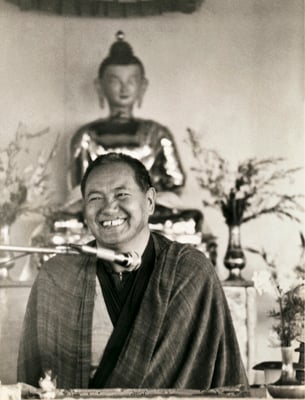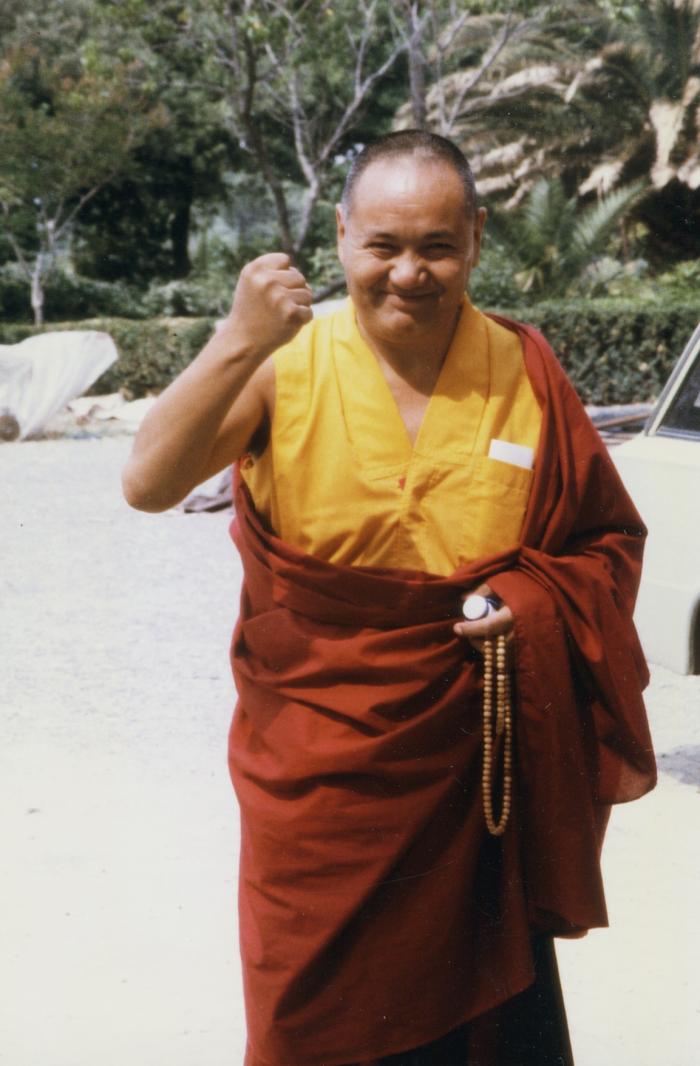Dear Friends,
First, I really want to thank from the bottom of my heart not only those who have created this amazing work but also those kind LYWA supporters who have made generous donations to this important book.
The response to our recent mailing, which hopefully you have seen, was wonderful, and we’re grateful to the many people who contributed $250 or more in order to become sponsors of the project. By offering this amount, you will receive a copy hot off the press, help us keep the price down so that more readers, centers and libraries can afford it and create the merit of making the great, incomparable Lama Yeshe’s life story available to all.
So please, join the many kind supporters of this project and make your donation today!
Finally, please read on to enjoy the video of the author, Adele Hulse, reading from Big Love: “Thubten Yeshe meets a Russian Princess”!
FROM THE VIDEO ARCHIVE: A reading by Big Love Author Adele Hulse
Big Love author Adele Hulse gives a dramatic reading of the story of Zina Rachevsky, the first Western student of Lama Yeshe and Lama Zopa Rinpoche. This excerpt begins with Zina's birth, moves onto her wild youth and tumultuous adulthood and ends with a description of Zina's first fortunate encounter with the Lamas in India. This excerpt is from Big Love: The Life and Teachings of Lama Yeshe, Volume 1, Chapter 5: “1967: Thubten Yeshe Meets a Russian Princess.” Film of Adele by V2D Recordings. Video editing by Megan Evart.
Visit and subscribe to the LYWA YouTube channel to view dozens more videos freely available from our archive.
This month on the LYWA Podcast: The Benefits of Purification
There's no other way to do this perfect work for others, so therefore one must actualize the steps of the path to enlightenment; to do that one must purify the obstacles, the negative karmas, obscurations, so therefore then one must do Vajrasattva practice which is the most powerful one and by which any negative karma can be purified.
-Lama Zopa Rinpoche
 In this month's podcast, Lama Zopa Rinpoche explains the suffering realms of samsara and the benefits of immediately ending all our nonvirtuous activities and working quickly to purify all past negative karma. In this way we may avoid the suffering realms while we practice the path and attain enlightenment for the sake of all. Rinpoche gave these profound teachings before a Vajrasattva initiation at Jinsiu Farlin Center in Taiwan in 1994. You can also read along with the transcript on our website.
In this month's podcast, Lama Zopa Rinpoche explains the suffering realms of samsara and the benefits of immediately ending all our nonvirtuous activities and working quickly to purify all past negative karma. In this way we may avoid the suffering realms while we practice the path and attain enlightenment for the sake of all. Rinpoche gave these profound teachings before a Vajrasattva initiation at Jinsiu Farlin Center in Taiwan in 1994. You can also read along with the transcript on our website.
The LYWA podcast contains hundreds of hours of audio, each with links to the accompanying lightly edited transcripts.See the LYWA podcast page to search or browse the entire collection by topic or date, and for easy instructions on how to subscribe.
What's new on our website
 We have posted two new teachings by Lama Zopa Rinpoche on emptiness this month, both excerpted from teachings given in Bodhgaya, India, in 2012 and are edited by Ven. Ailsa Cameron. In the first teaching, Rinpoche discusses the appearance of true existence and explains that with intensive purification practice, the support of great merit, and strong guru devotion the false I can be recognized and the knot that has been there for beginningless rebirths can be untied.
We have posted two new teachings by Lama Zopa Rinpoche on emptiness this month, both excerpted from teachings given in Bodhgaya, India, in 2012 and are edited by Ven. Ailsa Cameron. In the first teaching, Rinpoche discusses the appearance of true existence and explains that with intensive purification practice, the support of great merit, and strong guru devotion the false I can be recognized and the knot that has been there for beginningless rebirths can be untied.
In the second teaching, Rinpoche explains how to meditate on emptiness in our busy daily lives by continually practicing awareness of right view by remembering this verse when problems arise.
A star, a visual aberration, a flame of a lamp,
An illusion, a drop of dew, or a bubble,
A dream, a flash of lightning, a cloud—
See conditioned things as such!
Rinpoche advises to continuously practice awareness of the hallucination by looking at everything, which is a hallucination, as a hallucination, from morning until night as another way to meditate on emptiness in daily life.
Big Love Update
Each week the publication of Big Love comes closer! Right now we are proofreading the index, doing a final check on the hundreds of photos, planning distribution and preparing to send the book to the printer.
A few days ago we sent an email to our fellow FPMT Centers, Projects and Offices with details on how they can reserve a copy of Big Love and place bookstore orders. If you didn’t receive the email, please let Jen know.
Once again, thank you so much for your kind and generous support of LYWA, without which we could not do what we do. And especially at this time, as the Big Love project draws to a close. So, at this crucial time, please do support Big Love!
Big love,

Nick Ribush
Director
THIS MONTH'S TEACHING: The Peaceful Prison
 The one who takes precepts is very fortunate. If we don't act, then what can we do? You are taking precepts because you want to do something, aren't you? Actually, the world today is so impure, so impure. If you look at the political situation in the world, even in Australia, you can see how people are cheating each other and how unbelievably impure the world is becoming. You can see that. What you can do to make the world better is to act better, isn't it? Instead of worrying, “The world is becoming disastrous, everybody is becoming impure therefore I want to become impure,” instead of thinking that way, “The world is impure therefore I want to become impure too,” we should see that that is no good, that is not a solution. For the world and human beings to become better, the solution is for us to act better. We should not look at the world, “The world is doing this this this, therefore I am doing that, that, that.” We cannot say that.
The one who takes precepts is very fortunate. If we don't act, then what can we do? You are taking precepts because you want to do something, aren't you? Actually, the world today is so impure, so impure. If you look at the political situation in the world, even in Australia, you can see how people are cheating each other and how unbelievably impure the world is becoming. You can see that. What you can do to make the world better is to act better, isn't it? Instead of worrying, “The world is becoming disastrous, everybody is becoming impure therefore I want to become impure,” instead of thinking that way, “The world is impure therefore I want to become impure too,” we should see that that is no good, that is not a solution. For the world and human beings to become better, the solution is for us to act better. We should not look at the world, “The world is doing this this this, therefore I am doing that, that, that.” We cannot say that.
Remember last year, there was one man, Jim Jones, who became some kind of big guru. The result of what he did was that he killed all his students by poison—unbelievable. He was doing that, “The world is horrible now, I must kill all my students.” That can't help, can it? But that horrible situation is reality too. You learn, we learn. I think it is good, that man demonstrated how the human mind is. I think that Western people should learn from that also, I think that he is showing us a great realization. Somehow the Western mind has no wisdom to judge who is the right leader for salvation or liberation; we don't have discrimination. We blindly follow, “Aaaaaah,” like this. [Lama shows being led by the nose] Can you imagine such people who choose that kind of leader, they even take that one. Unbelievable. I could not believe it myself. However, instead of our blaming those people we should know that they are human beings, the same as us. If we are not careful, we might end up in that sort of situation.
So somehow it is really fortunate that you people have decided that you want to act better, you want to correct your own actions and transform them into tranquility and peace. I think that is incredible. A brave mind. Especially, we know how difficult it is in the West to live a pure life. It is so difficult. The Western environment is like soup—everything is overwhelming, there are all kinds of things going on, unbelievable things, and especially, if there is some impure action happening everybody is interested, everybody wakes up to do impure things. But when there are really pure things to do everybody gets sleepy, everybody becomes kind of sloppy and dull. We understand this situation is difficult, but the individual, recognizing his own weaknesses and how he causes his own problems, really wanting to act, to follow the right livelihood and direct himself to the liberation of enlightenment, is so worthwhile, so worthwhile. If we do that it means that we are not hypocritical, we are acting in some way.
And also, I want you to understand that by taking the precepts you are not promising something to Lama. “I want to take refuge; I won't do this or that.” The Buddhist way is not like that. By taking precepts you are receiving some energy or gaining some kind of energy to counteract dissatisfaction. In fact, the precepts are the path to enlightenment, so they are really worthwhile. Difficulties result from our uncontrolled mind, not from circumstances. Taking precepts is the real Buddhist way of treating the mind, of understanding how the sensitive emotional mind works and how we become neurotic. That is good, we can recognize these things by taking precepts. Otherwise we don't recognize, we don't recognize the space and time between here and the crazy mind—we just end up in such situations. But precepts make you aware of what your attitude is, of what is going on in your mind. The purpose of taking precepts is also to develop higher consciousness or to develop comprehension of the nature of your own mind.
I want you to understand what is involved in breaking a vow. For example, let's say that you have vowed not to kill. The most important thing is the way in which you kill, the attitude with which you kill. I don't want you to take it literally, “I promised not to kill, I took the precept to avoid killing. After that while I was walking to the kitchen, I think I killed an insect, so I broke my vow immediately, ooooh.” [Lama shows crying] I don't want you to understand it that way. I'll tell you why. Sometimes the Western mind is wonderful, sensitive; they take things so seriously. Even when they take precepts they take them so seriously, they take them in a really concrete way. I don't want you to take them that way. I want you to understand that when you are taking the precept of not killing it is the attitude—either hatred or desire—that is most involved. When you act unconsciously, there is no breaking of the vow, I want you to understand. If you kill somebody in a dream, of course there is some negative energy but don't think that you are breaking your vow. You are not breaking it.
To break the vow you have to have the attitude of deliberately wanting to kill, and then performing the action, and then afterwards feeling happy, “Good, finally I was successful.” It has that kind of evolution. So to break the precept of killing there has to be this evolution—that is the way you break it. You cannot break it by killing somebody accidentally—perhaps you are going somewhere and accidentally you knock somebody over and they fall into the ocean and drown. Who is responsible? You are not really responsible, and you should not feel guilty. You had no intention to drown that person in the ocean. Therefore, you should not feel guilty, “Oooh, now I have broken my vow, better that I jump in and drown myself also.” That kind of thing is foolish, we should not do it.
You see, there is the attitude, that brings you toward the action and then there is the completion of what you aimed to do; that is the way you break the precepts you have taken. Therefore, really, don't worry. Anyway, people who live in Western cities are very little involved with nature. They are not involved in killing things unless they are army generals. An army general just sits in his concrete house and says, “Hey! you go there and kill immediately.” But we are simple people, not involved in anything, so somehow it is lucky.
And also, if the situation really involves compassion, if the attitude is compassion, there is completely nothing to do with the self-cherishing thought, it is only compassion, only compassion concerning the welfare of other sentient beings; if you kill in those circumstances with the right reason, there is no breaking of the vow. That is not the sense of breaking the vow of not killing. The vow is broken only if there is a negative mind creating a negative action. That is the way the mind becomes unhealthy; that is the way we say the vow is broken. Otherwise, there is no reason.
The reason I'm telling you all this is that many of my students are so sensitive, “Lama, I have broken my vow.” I discuss with them, “How did you break your vow?” Many times they didn't break their vow. They took it kind of literally and they felt they had broken it, but they hadn't. That's the reason I'm telling you this. I want you to understand that to break any of these five precepts, it is necessary to have the basic attitude of either craving desire, grasping or hatred. When you act in such a way, completely, then we can say the vow has been broken. I think it is fortunate to come to such conclusion.
Lama Yeshe gave this teaching at Chenrezig Institute, Eudlo, Australia, on September 12, 1979. Edited by Nick Ribush. You can find the complete teaching here on our website.





























